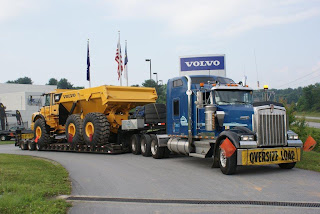 |
| Heavy Haul Trucking Business |
If we ask any person close to the heavy haul trucking industry how to cut costs, the response will most likely center around the truck itself: gasoline, maintenance, insurance, and driving labor. But, most of these expenses have little flexibility, short of changing the provider. To truly cut expenses a heavy haul trucking company must get smart and look at the internal operations of the company. And typically they don't have to look very far.
Majority of heavy haul trucking companies do things old school. They use phrases like "If it isn’t broke, don't repair it". A heavy haul trucking company that does things "the old way" without end will soon find itself struggling to stay afloat once they can no longer work at market prices. Technology improvements play a chief role in nowadays business environment allowing for greater efficiencies and cutting the expenses of operation. There have been excellent strides made in technology for trucks to create them more fuel efficient and cost less to maintain. But these advancements can only be found on newer trucks rolling off the assembly line.
If our fleet is only three to five years old it may be another three to five years before we can buy all new trucks to take benefit of the new equipment. Therefore where else can new technology be installed within our business to cut expenses for the company? The office operations.What most heavy haul trucking companies don't see is that with small or no technology in the workplace, the huge quantity of paperwork and dispatching duties must be handled manually which takes people lots of them. Technology developments as minor as color coded folders or an extra phone line be able to have a big return on workflow efficiency.
The major idea is to give the workplace with the right tools to increase the amount of work it can at ease handle. Take dispatching for example. It is frequently the most critical position within a trucking operation. Majority of trucking companies set off with one dispatcher, maybe it’s the proprietor. Then as they add up more trucks, they add a second dispatcher to manage the phone calls to and from clients and drivers handling all of the freight loads. As the business gets bigger, and the fleet size expands, perhaps a third dispatcher is added.
Nine times out of ten a trucking follows these steps without stopping to consider how many trucks a dispatcher must be able to handle. And if they don't consider the optimum number of trucks for each dispatcher, then they as well don't think a tactic to increase the number of trucks that a single dispatcher be able to handle. This simple tactic of analyzing the efficiency of dispatch, the vital role in the company, could save the company tens to hundreds of thousands every year in wasted salaries. The solutions to boost dispatch productivity may be to make upgrading to paperwork or communications.
Majority of heavy haul trucking companies do things old school. They use phrases like "If it isn’t broke, don't repair it". A heavy haul trucking company that does things "the old way" without end will soon find itself struggling to stay afloat once they can no longer work at market prices. Technology improvements play a chief role in nowadays business environment allowing for greater efficiencies and cutting the expenses of operation. There have been excellent strides made in technology for trucks to create them more fuel efficient and cost less to maintain. But these advancements can only be found on newer trucks rolling off the assembly line.
If our fleet is only three to five years old it may be another three to five years before we can buy all new trucks to take benefit of the new equipment. Therefore where else can new technology be installed within our business to cut expenses for the company? The office operations.What most heavy haul trucking companies don't see is that with small or no technology in the workplace, the huge quantity of paperwork and dispatching duties must be handled manually which takes people lots of them. Technology developments as minor as color coded folders or an extra phone line be able to have a big return on workflow efficiency.
The major idea is to give the workplace with the right tools to increase the amount of work it can at ease handle. Take dispatching for example. It is frequently the most critical position within a trucking operation. Majority of trucking companies set off with one dispatcher, maybe it’s the proprietor. Then as they add up more trucks, they add a second dispatcher to manage the phone calls to and from clients and drivers handling all of the freight loads. As the business gets bigger, and the fleet size expands, perhaps a third dispatcher is added.
Nine times out of ten a trucking follows these steps without stopping to consider how many trucks a dispatcher must be able to handle. And if they don't consider the optimum number of trucks for each dispatcher, then they as well don't think a tactic to increase the number of trucks that a single dispatcher be able to handle. This simple tactic of analyzing the efficiency of dispatch, the vital role in the company, could save the company tens to hundreds of thousands every year in wasted salaries. The solutions to boost dispatch productivity may be to make upgrading to paperwork or communications.
No comments:
Post a Comment